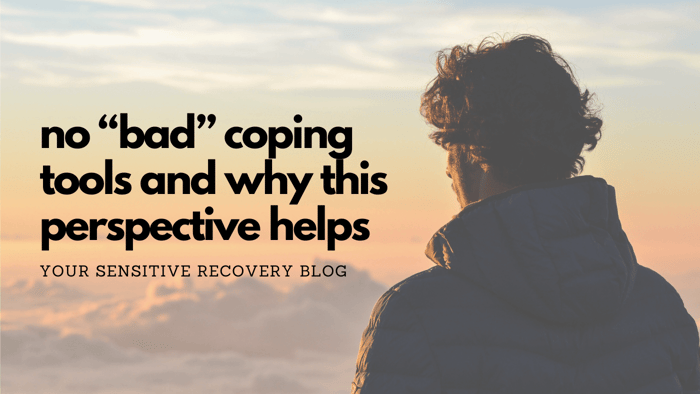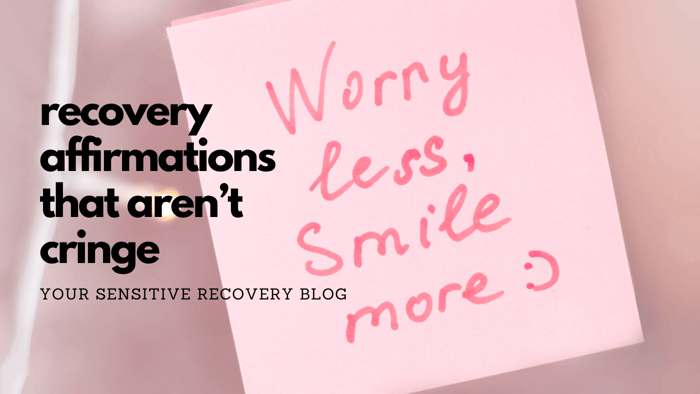One of the hardest parts of dealing with an eating disorder is suffering through the relentless barrage of negative, intrusive thoughts. The eating disorder voice can be vicious, cunning, and deceitful.
At times, many attempt to ignore the thoughts, white-knuckling through each day using distraction as a primary means of coping. At other times, that voice prevails over reason, leading to disordered behaviors that further strengthen the power of the intrusive thoughts.
Through my years as an eating disorder survivor and as a therapist specializing in treating these issues, I've gathered quite a few tools for dealing with a mind that feels hell-bent on self-destruction.
And I want to share one of the simplest and most effective of these tools. Read on.
We Are Not Our Thoughts
It's far too easy to believe that our thoughts should define who we are. But it's not that simple. Thoughts are mental events that reflect how our brain processes information and attempts to make sense of situations. At any given moment, our thoughts are directly influenced by our experiences, emotions, and perceptions.
It's dangerous to put too much stock in our thoughts.Here's an example you may relate to: During an eating disorder relapse, you think, "I'm not capable of recovering." This is an easy thought to believe in a moment when you are already beaten down and compromised mentally, emotionally, and physically. But if this same thought were to occur during a time in recovery where you are progressing and doing quite well, you might not give it too much attention. In fact, you might barely even register that it floated through your consciousness.
Humans, at times, are capable of extreme thoughts that never "see the light of day." Or if they do, there is a recognition that we've thought or said something we didn't really mean or don't really believe.
Making Space for the Observer
As thoughts come and go, like weather across the sky (notice that the sky is still the sky no matter the weather), we have two choices: we latch on to them, or we let them float on by. Our ability to let them pass lies in our ability to separate ourselves from our thoughts.
We do this by observing.
Cognitive Defusion is a powerful tool from Acceptance and Commitment Therapy that allows us to do just that. You can see from the name of the tool how it works; it is de-fusing, or separating us from the thought itself.
Look, you are not responsible for a thought popping into your head. You are responsible, however, for what you do with that thought.Do you latch on to it, mull it over, ruminate on it, and let it fuel other unhelpful thoughts? Here's how to use Cognitive Defusion to stop that process. The next time you notice a negative, intrusive thought add one of the following phrases to the beginning of it:
- I am having the thought that...
- I notice that I am thinking that...
So instead of, "I can't tolerate this if I don't purge now", it becomes: "I am having the thought that I can't tolerate this if I don't purge now" or, "I notice that I am thinking that I can't tolerate this if I don't purge now."
Do you sense that power shift?
When you are the Observer of your thoughts in this way, you cannot be the thoughts themselves.
Don't Believe Everything You Think
Unfortunately, our thoughts don't always serve us, but they may serve some purpose. Getting curious about that purpose is worthwhile.
I remember a moment back at the height of my eating disorder when I had a fight with my partner at the time. I was distraught and overwhelmed, shame running on all cylinders. I ended up alone in the bedroom facing the thought that I was unworthy of love because of my eating disorder.
Everyone wants to be able to believe what we think. We want to be right. It feels safe to trust our brains. But we often use experiences as "evidence" for beliefs that keep us sick and stunted.It occurred to me at that moment in the bedroom that believing the thought that I was unworthy of love would continually lead me back into the arms of the eating disorder. As long as I agreed, I could stay stuck, and I wouldn't have to face the fear and challenge of healing myself.
A little dose of humility in that moment went a long way.
Strengthening Our Resilience
Understanding that we are not our thoughts is a powerful insight that can transform how we experience life. When we can pause long enough to recognize that thoughts are temporary, not always fact-based, and are absolutely changeable, we can more easily bounce back from challenging situations and emotions. This is how we strengthen our resilience.
By practicing cognitive defusion, we can learn to observe our thoughts without being overwhelmed by them.
Remember, you are the sky, and your thoughts are just weather moving through you. Embrace this perspective, and you’ll find greater peace and clarity that will continue carrying you through your recovery and beyond it. ☀️
✨ Josie Munroe, LMFT is a licensed therapist and owner of JosieMunroe.com and Your Sensitive Recovery As a recovered clinician and Highly Sensitive Person, she loves supporting others on their journeys to form new, empowered relationships with food, their bodies, and their sensitivity. Join the newsletter for a weekly boost of hope and inspiration. You deserve a recovery that works for you! ✨





